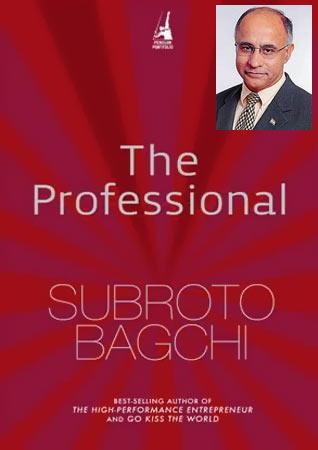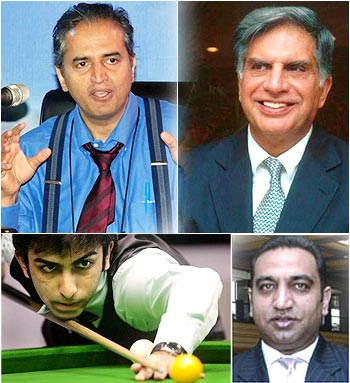 | « Back to article | Print this article |
'For the first time India is known for her professionals'
Subroto Bagchi may not have yet achieved the stature of a management guru, a la Peter Drucker or C K Prahlad, but it looks like he will soon do it one day. For, this co-founder cum gardener at MindTree Ltd has written three books in just five years on career development and management and is ready with his thoughts to pen one more in the near future.
After the success of The High Performance Entrepreneur and Go Kiss the World, Bagchi recently published his third book The Professional.
The book dwells on who can become a professional during his career and delineates the difference between a competent employee and a professional employee.
In a chat with Prasanna D Zore, Bagchi discusses inspiration behind The Professional, the qualities that make a professional, the lessons he learnt in his life and of course how the young should handle economic hardships during recessionary times.
What inspired you to write The professional?
The whole idea of writing The Professional has been in my mind for a long time. But I thought The Professional's time has come because India is becoming mainstream in the scheme of world affairs and for the first time India is known for her professionals.
So as the world is becoming the playfield for the typical Indian professional, I felt that we should have a conversation on what does it take to be called a professional beyond just professional qualifications.
In India we think that when we have professional qualifications we become professionals. But to be a true professional it requires a lot of qualities and attributes.
What's the definition of a professional?
First and foremost a professional is a person who can self-certify completion of a task and can work unsupervised. If somebody else is required to certify that this task needs a particular standard then you are not a professional. This is a very small, but very subtle and important, distinction between being competent and being a professional.
Who is there to supervise the midwife when a pregnant woman gives birth to a child and the midwife sews and puts the umbilical cord in place? It has to be a perfect job which she does without any supervision. So for me she is a professional. Only she knows under those circumstances that she has done it with perfection.
If the midwife had not done that job perfectly then you and I would not be here talking to each other.
What are the qualities, attributes, traits that play an important role in shaping professionals?
In this book I am trying to tell the world that you will find a lot of competent people in any given field. They may be competent, but they may be never respected as professionals unless they do their job with integrity.
The difference between being competent and being professional is the difference brought about by the presence or absence of self-awareness.
Apart from self-awareness and integrity there are other attributes like the capacity to certify completion of work. Self-awareness is all about knowing who am I, being honest to myself about my strengths and weaknesses, knowing when to seek help.
But beyond that there are different qualities depending on different levels of growth in your profession. In your 20s as a professional you have to build qualities that make your comfortable dealing with volume. In your 40s it is not about volume but dealing with complexities.
'I think Karambir Singh Kang is a professional's professional'
Can we make professionals in classrooms?
That is my frustration. You know in the book I have talked about the simple workplace things we have to talk about when an engineer joins a company or when a trained journalist comes and joins a publication or when a young doctor comes and becomes an intern.
You can't watch a video and become a surgeon; you can't watch a video and become a journalist. You have to go through the ups and downs, the thick and thin; you have to dip your own hands in. So you cannot just simulate it in a classroom.
One of the things why Indians don't get to understand workplace issues till they are 23 or 24 is because they don't go to work as youngsters. When a 13 or 14 year-old in a country like the US or Japan or Europe or anywhere goes and works in a store, packs bags, or becomes a gas station attendant that individual knows the difference between my time and company time, my money and company money, what is the meaning of a paying customer.
So when you are a waiter or a waitress at 14 you know very well that you can't be on a cellphone when a customer walks in. The point is simple: workplace issues may not be understood when you take a big degree from a reputed college. You can make people aware about issues in a classroom but you can't make professionals in a classroom.
What differentiates a professional from a competent person?
A professional, at the end of the day, is a person who is remembered. If you don't want to be remembered then you don't need to waste time reading the book (The Professionals).
So if a handful of people are sitting in a cafeteria one individual walks in, people turn their head, some of them get up, if people feel good by sheer presence of that person you know that a professional's arrived. That feeling cannot be weighed in money.
Professionalism is about building a legacy, an inheritance. A professional is a person who has affection for his profession; only then will you be able to build a legacy that you want to give to your profession that didn't exist in my times. That's what motivates a professional.
Can you list five professionals who you admire and respect the most?
In sports I like Pankaj Advani in the way he handles himself. I think he is a true professional.
I think in the field of medicine Dr Devi Shetty of Narayana Hrudayalaya is a professional.
I think Karambir Singh Kang, who was the general manager of this hotel (in the Taj Mahal Palace and Tower hotel, where we are sitting) when terrorists attacked it on November 26 last year is a professional's professional. Here's a man who cremated his wife (Karambir Singh's Kang's wife and two sons died of asphyxiation after grenade explosions set their room on fire).
I think Ratan Tata is also a professional's professional. Look at the way the man has handled controversies and the way he handled the shifting of his car plant from West Bengal to Gujarat. He showed constraint in the face of confrontation.
In your assessment is the worst over for India's young employees given the economic environment in the recent past?
I think today's youth are growing up in a truly liberated India. Today's India is economically liberated and very soon hopefully we will be intellectually liberated which is very different from economic liberation.
My generation grew up in a politically-liberated India. While today's generation is growing up in a politically and economically-liberated India, the problem is we may still be intellectually held hostage by certain forces. But hopefully that will change over time.
'Ordinary people always do extraordinary things'
Are these forces internal or external?
Interestingly, when you fight a political battle usually the forces are external. When you are fighting an economic battle the forces are partly external and partly internal. But when you fight an intellectual battle it is your own battle. Only you can be blamed if you don't come out a victor of that.
Life lessons that you have learned...
The most important lesson I learned in my life is that ordinary people always do extraordinary things. If you look at history the most significant, the most talked about achievements have all been done by ordinary people. So that's a hugely uplifting thought that inspires me in my life.
I was interviewing Dr Devi Shetty for my column in Forbes India and he told me that the best surgeons from the world come from deprived backgrounds. In today's world you don't need to know someone to become somebody. You need to know something to be somebody.
'It's a great time to be young and alive in India'
How should young employees handle the current economic situation?
Don't think too much about the current economic situation. This is just a blip. I think these youngsters need to pace themselves. Don't be in a rush to do something. Take a long view of time.
I'm 52 now, I have founded a company and you will be surprised that I built my first house at 40. Till my second daughter was born I had a Yezdi motorcycle. I had my first Maruti van when I was 30.
Material comfort and material aspirations are necessary but remember that they don't define who you will be. They have only so much power to satisfy you. Don't hanker after things. You have a 40-50 career ahead of you. Nothing will happen even if you don't own a house at 35. So don't be on an overdrive on material aspects of life at a young age.
If I were to give an advice to somebody who has some disposable income today instead of a rush to go and buy an apartment in which you will probably never live -- because after that you will find that you will have to work some place else -- better go and see the world. Invest in yourself. Take you spouse along with you and study arts, literature and culture of various countries. Enrich yourself intellectually, emotionally before you enrich yourself with material things.
Don't teach your profession as a slot machine, as a stepping-stone because if you will do that then someday your profession will treat you like a stepping stone.
Build affection for your profession. Don't just do your job, see around, look around and see what truly admirable people in your profession are doing and what they are doing.
Finally, what role could young Indians play in making India a country of professionals?
I think it's huge. I was looking at the newspapers the other day and saying that Mr Manmohan Singh is standing next to the Presidents and Prime Ministers of G20, when will we be in G10? When will we be in G8? The growth from G20 to G10 to G8 is not just about India's GDP. It is about are we breeding world-class professionals or not? Are our plumbers the best in the world? Are our architects the best in the world? Are our journalists the best in the world?
It's a great time to be young and alive in India. It is a great time to take charge of moving India from G20 to G8.
And do you have faith in India's young to do that?
Yes. Otherwise I wouldn't have written the book.


